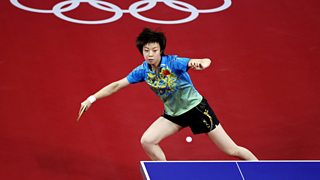Five ways table tennis changed the history of China
Table tennis has traditionally had a rather cosy image – a game of youth hostels and summer camps. But for one country the humble game of ping pong transformed its future. In the three-part series Sideways: China’s Ping Pong Power, Matthew Syed, journalist and former table tennis champion, investigates how the game became China’s most enduring sport and helped transform a nation. Here are five key moments when ping pong altered China’s place in the world…

Listen to China's Ping Pong Power
The incredible story of how ping pong transformed a nation. Presented by Matthew Syed.
1. China’s first World Champion
In the first half of the 20th century, China was not much of a factor on the international sporting stage. That changed with Rong Guotuan. In 1959, Rong won the Table Tennis World Championships, becoming the People’s Republic of China’s first world champion in any sport. A man from a humble background who learned table tennis in his father’s office, Rong became an overnight celebrity and was celebrated by Chairman Mao Zedong and his communist regime.

A man from a humble background who learned table tennis in his father鈥檚 office.Rong Guotuan, China's first ever world champion
Those in power saw that table tennis could be a route to giving China prestige across the globe and the Chinese people a sense of national pride and the government began encouraging table tennis everywhere they could. At the time, China was considered poor and largely powerless. Rong’s sporting success conveyed strength, and the government wanted more of it.
“Since 1895, when the Chinese were defeated by the Japanese [in the First Sino-Japanese War], China has linked sport with national identity, national honour and national humiliation,” says Professor Xu Guoqi, an expert on China’s approach to sport. “Some Chinese openly acknowledged China was the ‘sick man of Asia’. The country was sick. The Chinese people were sick. Their bodies were sick. To win the championship, that’s a big, big step forward. The Chinese can say they’re confident enough to compete with the best on an equal footing.”
With Rong’s win, table tennis exploded in popularity. China was going to become a player.
2. China hosts the World Championships
Rong Guotuan’s win gave China a major opportunity to shape its international image. China’s communist regime tightly controlled the release of information about the country, which meant the world knew little about it. After Rong’s victory, China was asked to host the 1961 table tennis world championships, which would allow the nation to invite the world in, on its own terms, and show its sporting prowess.
The USA, China’s greatest Cold War adversary, boycotted, but much of the rest of the world came, including Great Britain. Suddenly all eyes were on China. “The [British] national newspapers, which didn’t have much interest in table tennis, were sending top reporters to cover the event,” says Ian Harrison, part of the 1961 England national team. “It was a heavily state-sponsored event. They built a special stadium for it, which held 12,000 people.”
Visiting players and press were treated like royalty, so the outside world saw a prosperous China, their attention largely diverted from people living in poverty and dying of starvation outside the major cities. With Chinese players victorious in the men’s and women’s singles, and the men’s team event, it was a propaganda triumph. China was pushing a new image out to the world.
3. The chance encounter on a team bus that triggered earth shaking events
The Chinese table tennis team disappeared from competition for much of the 1960s, they had been sent down to the countryside for reeducation during the Cultural Revolution.
Cowan could have expected a hostile reception, but Zhuang Zedong, China鈥檚 star player, handed him a painted scroll.How a simple mistake had extraordinary consequences.
In 1971, the grip of the cultural revolution briefly loosened and the surviving members of the Chinese team reappeared at the Table Tennis World Championships in Nagoya, Japan. Also there was Glenn Cowan, a hippie member of the American team, who attracted attention with his flamboyant outfits. One day, after a practice session, Cowan got on the wrong team bus back to the US team hotel and found himself surrounded by the Chinese team. This mistake would have extraordinary consequences.
“America and China’s governments had no diplomatic relationship [at the time],” says Syed. “Chinese communist propaganda described Americans as capitalist dogs. The Americans regarded China as a major strategic threat. The American president, Richard Nixon, made his name as a vehement anti-communist.” Cowan could have expected a hostile reception, but Zhuang Zedong, China’s star player, handed him a painted scroll. The gift was a gesture of friendship and the handover was captured by press photographers. The pictures went around the world.
A simple handshake between the USA and China’s respective table tennis stars sent a message that China was prepared to make nice with the USA. On the last day of the championships, Chairman Mao invited the American table tennis team to visit China. Not long after that visit, and all its accompanying media coverage, US Secretary of State Henry Kissinger made a secret trip to China. Nixon met Mao in 1972 and China and the USA formed an agreement to seek ways to work together. China was no longer out in the cold and was on a path to becoming one of the biggest trading nations in the world. It can’t be said for sure that it was down to that meeting on a bus, but it certainly helped pave the way.
4. A new grip
China had turned table tennis from a gentle pastime into a global sport – one it dominated for years. But by the 1980s its dominance was fading. Sweden was emerging as a major challenger, with new technology and new approaches to the game.

The Swedes had identified a flaw in the Chinese game: they all played in pretty much the same way. That wasn’t chance, says Syed. “Individualism was suspect and all should follow the doctrines of the all-pervading party… This approach was central to table tennis too. It was clear to everyone in the game that the party favoured the ‘pen-holder’ technique.” All Chinese players used the same grip and same style, which the Swedes were able to easily outdo with their inventive techniques. At the 1989 World Championship final the Chinese men's team lost every single match to the Swedes.
But things were changing within China. Since the death of Chairman Mao, his successor, Deng Xiaoping, was tentatively encouraging innovation. He was open to people making their own choices, if they benefited the country. In this new era, the Chinese table tennis team began to deviate from the pen holder grip, and they were allowed to keep any prize money they won. This was huge. Freed from government control, and with the prospect of great riches if they won, players found their own styles. In 1995, Kong Linghui, abandoning the pen-holder grip, won the World Championship title.
The change in table tennis became emblematic of a change in China. Where once the Communist Party would even tell farmers how to plant their seeds, the government was now allowing some individuality in the hope that change would make a more prosperous China.
5. The Beijing Olympics
There’s no greater sporting showcase than the Olympic Games. Beijing was chosen as host of the 2008 Summer Olympics and China intended to use this moment to demonstrate its strength. Its aim was to top the medal table, besting even the seemingly unbeatable Americans. It definitively achieved its goal, winning 48 gold medals to the USA’s 36. In table tennis, China won gold, silver and bronze in both the men’s and women’s singles, and gold in the men’s and women’s team events. It could not have done any better.
“2008 really was a transformative moment for China,” says Tania Branigan, former China correspondent for The Guardian and author of the book Red Memory. “It was its coming out party. They had this dazzling medal tally and simply wiped the board when it came to table tennis.” The Olympic Games was China’s chance to show its power and modernity. And Xi Jinping was in charge of preparations for the 2008 Summer Olympic games, five years before he became president of the People’s Republic of China. As Branigan explains, Xi knew the importance of putting on a dazzling Olympics, and understands the symbolism of sport “It’s also something that really fits in with his broader message of national rejuvenation, this sense of the country being back at the forefront of being strong. So the message you hear a lot in China is that Mao helped the Chinese people to stand up, Deng Xiaoping made them rich, but Xi is the one who is making the country stronger.”
In 50 years, China had gone from an isolated nation to one of the most powerful on Earth, and from a sporting irrelevance to a country that is consistently in the top three medal winners at the summer Olympics. And the change in China’s prospects was in no small part down to a small ball and two round bats.
More from Sideways
-
![]()
Listen to China's Ping Pong power
Matthew Syed guides us through a special three-part series for Sideways.
-
![]()
My Last 5p
How one homeless man鈥檚 generosity led to him marrying the love of his life.
-
![]()
A Nuclear Awakening
Matthew Syed explores urgent intellectual questions posed by nuclear weapons.
-
![]()
A Small Bowl of Rocket
Matthew Syed sticks his fork into the world of food to think about how taste is formed.



